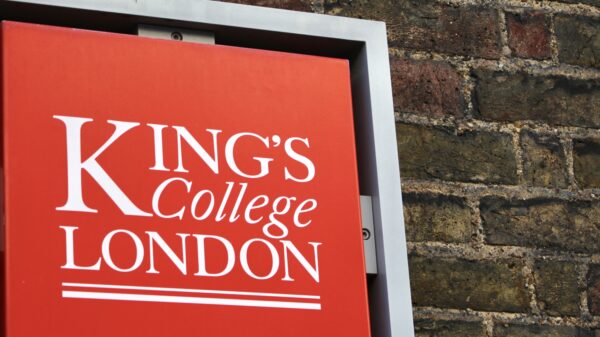Roar writer Arjan Arenas reviews the King’s Classics department’s annual Greek Play, “The Plague at Thebes”.
For nearly three-quarters of a century now, one of the undisputed highlights of the cultural calendar at King’s has been the classics department’s annual Greek Play, which has been going strong since 1953. For what will be 70 years next year, the classics department has prided itself on staging spectacular, well-produced productions of Greek comedies and tragedies performed in their original language. In more recent years, we’ve seen quite a few Greek Plays which have each been termed by their writers as “a contemporary reimagining”. These fuse productions with interludes in English geared toward a modern audience in layman’s terms, while retaining enough of the body of the original text in Ancient Greek to keep the purists happy.
One such contemporary reimagining was this year’s offering, “The Plague at Thebes.” Written by a group of ten writers and shepherded to the stage by creative director Marcus Bell, dramaturg Will Davies, and associate director Oliver Graham, this merged the tragedies “Oedipus Tyrannus” and “Antigone”, respectively the first and third instalments of Sophocles’ Theban plays. Antigone (Danielle James), the niece of King Creon (Ellie Scott-Smith) of the city of Thebes, has been arrested on her uncle’s orders and tried for treason, and impatiently awaits her sentence from inside a prison cell. Her crime was to bring the body of her fallen brother Polyneices from outside of the city walls and bury him, against the edict of Creon, who refused to afford the dignity of funeral rites to his nephew, a traitor to Thebes.
While incarcerated, Antigone learns the story, told through flashbacks in the original Ancient Greek, of her late father, Oedipus (Atharva Miskin), the erstwhile King of Thebes, who left the city in disgrace when his daughter was an infant, leaving her, her brothers and sister, and his kingdom in the care of his brother-in-law Creon. We witness how Oedipus, on his mission to seek divine redress for the titular plague ravaging his city and killing his subjects, learns from the blind prophet Tiresias (Caitlin Jackson) of a disturbing prophecy in which the king will kill his father and marry his mother. We watch as, despite Oedipus’ best efforts, the prophecy slowly comes to pass.

Photo by Giorgio Chinnici. The image has been cropped.
“Antigone” was first presented as the annual Greek Play at King’s 50 years ago, back in 1972, with a rendering of “Oedipus Tyrannus” following in 1978, and both plays have remained perennial favourite productions to stage ever since. With a long shadow of past interpretations, the pressure was presumably on to create a fresh, imaginative production combining both plays with something new to say. Graham stresses that while the play “is not a thinly-veiled Covid allegory”, much of the writing process offered a meditation on the pandemic.
The parallels between Covid and the eponymous disease afflicting the denizens of Thebes and our present-day plague are clear. In fact, they are expressed rather unsubtly in the play. Antigone learns of the suffering of her fellow Thebans and its exacerbation by the indifference and ineptitude of Creon, and while some of his subjects defend the king as a man doing his best under pressure, plenty more fear him as a brutal autocrat who will brook no dissent. It felt as though there was some room for a more probing examination of a divided kingdom in a time of crisis, and the multiple facets of its king; the play abruptly ends without going into Creon’s heartfelt redemption arc towards the end of the original “Antigone”. The on-screen subtitles above the stage during the segments in Ancient Greek often moved ahead of sync with the dialogue, at some points skipping back and forth, but here, my criticisms end.
The overall execution of “The Plague at Thebes” was accomplished and smooth, with the story concisely told within an hour-and-a-half. The alternating stories of Antigone and Oedipus are entertainingly wrapped within the time-honoured framing device of the Chorus, presented here as a group of schoolgirls (Scott-Smith, Jackson, Heather Shilling, Clotilde Chinnici, and Mishel Stefanova) playfully gossiping about Creon’s latest measures and speculating Antigone’s fate. In terms of aesthetics and audio, sparsity is the order of the evening, with the cast making the most of the gaping space on designer Ana Smoleanu’s set, adorned only by a tent and some scattered boxes and bottles. Composer Coraline Gatt keeps the sound design equally low-key, with the most memorable audio being the intermittent, ominous ringing of a church bell in Antigone’s cell, and the chanted prayer of the Chorus during a scene in Ancient Greek.
James offers a forceful lead performance as Antigone, alternating between dry, sarcastic insouciance as she rails against her imprisonment, and raw emotion as she confronts bitter truths about her family. Within a strong cast all round, special mention also goes to Jackson as an embittered, cynical Tiresias, and Scott-Smith as Creon, in whose able hands the king provides a commanding presence, torn between his family and his lust for power. Overall, “The Plague at Thebes” was an eclectic production carried out in style, successfully maintaining the high standards befitting such a great institution at King’s as the Greek Play.










